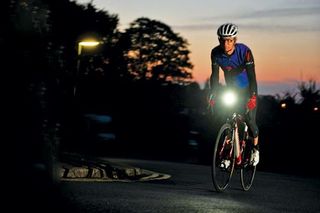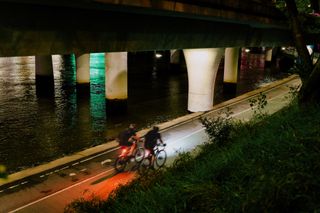It’s winter, it’s chilly, and half the time it’s dark. Those blissful evening rides you spent all summer enjoying, well they’re a thing of the past, right?
But wait there a moment, because that doesn’t necessarily have to be the way. There are some for whom night time rides can be some of the most rewarding of the year.
You will need the right equipment though, and to choose your route with a modicum of extra care.
It might not be for everybody, not when the comparative warmth of your shed / garage / spare room, with the music playing and the bright, go-anywhere lights of Zwift or Rouvy are calling.
We found two riders, one on either side of the night-riding fence, to give their perspectives.
YES – James Shrubsall
It’s a little like waking up to the thrum of rain. Staring out of the window, only to see your face reflected back at you against a backdrop of pitch darkness, does not exactly scream ‘let’s ride!’.
But if you have never been for a proper ride in the dark before, you have missed out on what can be a real treat for the senses.
The latest race content, interviews, features, reviews and expert buying guides, direct to your inbox!
I’m not talking about an urban evening commute across town, which the majority of us have probably done at some point – maybe you’ve got one lined up tonight.
To really immerse yourself in the beauty of riding at night, you need to lose the streetlights, head into the lanes, onto the trails and the tracks, find the viewpoints, and feel the silence.
The most practical way to do this is straight from work in the evening. That way it’s built into your day and you get home alight with a sensory rush that only night riding can offer.
But if you plan to do it this way, take your gravel bike (or CX bike or mountain bike), or wait till the rush hour has died down. Magical as exploring the lanes in the dark can be, hurrying rush hour motorists using them as rat runs is definitely going to spoil that enjoyment.
It goes without saying that you’re going to need a good front light for proper night riding. The inexpensive unit that works fine to keep you visible to other road users on your urban ride home won’t cut the mustard once you’re away from the soft glow of the streetlights. You’ll need something with around 1,000 lumens or beyond as your main light. If you can go one step further and supplement it with a helmet mounted item (doesn’t need to be as powerful), so much the better.
A decent (100+-lumens) rear light will also ensure you’re impossible to miss if you do plan a full-on road ride. With a super-bright rear light, stick to pulsing or solid light settings, rather than full on 90s-rave strobing, which can be disorientating to the driver behind in the pitch darkness.
The Dos and Don’ts of winter night riding

DO Buy the best front light you can afford
DO Supplement with a helmet light if you can
DO Tell someone where you’re headed if riding off-road
DON’T Pick a road route in rush hour
DON’T Set a super-bright rear to strobe
DON’T Forget to stop and take in the unique beauty of the countryside in the dark
It is, of course, the perfect opportunity to spend some money on new kit, and the good news is that it won’t break the bank. It’s worth doing though, as proper lights are really going to increase your enjoyment of the ride.
Night riding, in the lanes and especially out on the trails, is some of the purest riding you’ll ever do. In the dark and the quiet, the senses are turned up to 11. There are sounds you won’t hear, or register, in the daytime. The crunch of your tyres, or the hoot of an owl. Gain the high ground and enjoy the sight of your local town twinkling like a Christmas decoration, or stop, look up and take in the night sky. With your eyes already fully darkness-adjusted, you’ll see so much more than usual.
There will be rustlings and shufflings though, sometimes behind you. And that frisson that runs down your spine? Well, it’s all part of the fun – just don’t look back…
When you do finally emerge, blinking, into the glow of the streetlit roads once again, it feels like the warmest welcome home – a pat on the back for all your hard work.
NO: Tom Davidson
There’s a loop I usually do, after work at least once a week, where I dart up and down the hills in London. It’s a solid interval workout, and I love it. The route is tough, and it only takes me around an hour, but now three weeks have passed, and I’m starting to forget how the inclines feel.
Ever since the clocks turned back, I’ve brought my riding indoors. I lifted my Zwift trainer out of the basement, brushed off the cobwebs, and rolled out the mat in my bedroom. It’s not that I’m against riding outside in the dark, it’s just that, given the option, I prefer not to.
There are a few reasons for this. One is that, in London where I live, potholes are rife. Road workers are constantly digging up the tarmac, rearranging the busy network of wires beneath the city, and the road surface at the same time. Sometimes kinks appear overnight, waiting to dupe me in the darkness. Add in the shattered glass often at the side of the road, and there’s a potent mix of hidden traps I can no longer see.

(Image credit: Getty Images)
Like the glass and potholes, I also fear for my own ability to be seen. Statistics show that road traffic incidents increase at night, and even though I use lights – decent ones, might I add – I ride with a stomach-turning feeling that other road users can’t see me, particularly when looking at me side on. It’s a tension I don’t have to worry about when I ride indoors.
The final reason, perhaps a bit more sinister, is related to personal safety. This time last year, London was the subject of headlines about bike muggings. My patch of the city, in particular, was noted as a hotspot for the crime. While these incidents have tended to happen early in the morning, during hours I sleep through, I can’t help thinking about them most when I ride in obscurity. I find myself itching to get moving at red lights. Call me a scaredy-cat, but it feels safer to train indoors. Plus, I can ride in shorts, too.

